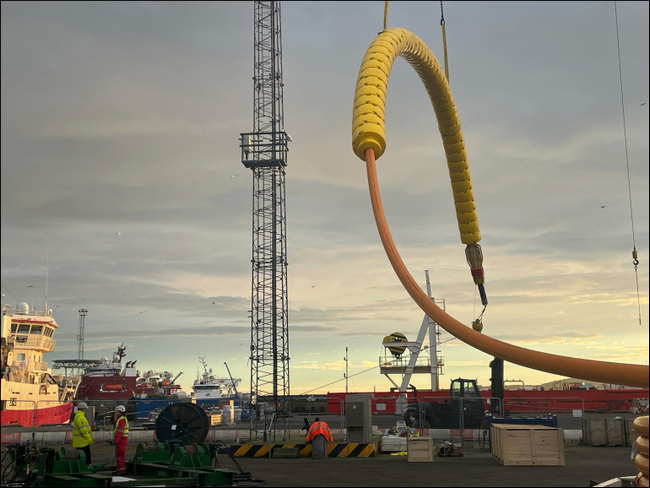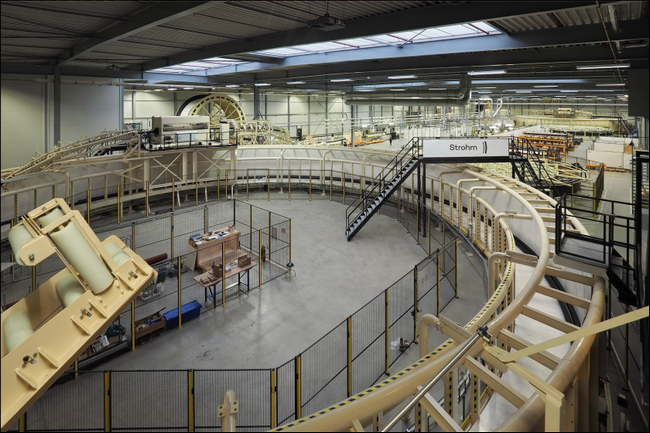Displaying items by tag: Strohm
Strohm supports Shell with fast-track delivery of a TCP Riser
Strohm has supplied Shell with a static Thermoplastic Composite (TCP) Riser to support operations at one of its Southern North Sea assets. The availability of TCP through Strohm’s “TCP on Demand” model and the ability to install end-fittings offshore enabled flexible, quick and easy installation.
Strohm was able to offer a fast-track delivery (January ’22) of their 2.0-inch 10ksi stock product, including all ancillaries, to support Shell’s tight schedule.
In a mature basin such as the North Sea, the pipeline infrastructure is ageing and, in some cases, pipelines are in need of replacement. For such a situation, TCP is an attractive solution. In this particular case for Shell, the TCP could be terminated above the J-tube, allowing for a smaller existing J-tube to be used, avoiding the need for any welding or curing. Strohm, together with their trusted partners, included a fast-track supply of the J-tube bellmouth, centralizer, bend restrictors, hang-off clamps, providing a full solution with a quick turnaround.
Strohm has the largest track record globally for the production and delivery of TCP. It is a strong, corrosion resistant composite pipe solution with a long, maintenance free service life. TCP is spoolable and delivered in long lengths allowing operators to use existing field support vessels on long-term charter rather than mobilising dedicated pipelay assets, making significant efficiencies and supporting lower carbon emissions targets. TCP has a 100% track record of no failures on installed pipe.
 Strohm’s TCP Flowline features Subsea Energy Solutions’ bend restrictor, topside clamps and subduct for a fast turnaround project with Shell. Image supplied courtesy of Subsea Energy Solutions
Strohm’s TCP Flowline features Subsea Energy Solutions’ bend restrictor, topside clamps and subduct for a fast turnaround project with Shell. Image supplied courtesy of Subsea Energy Solutions
The technology is increasingly being considered in the renewables sector, including offshore hydrogen and carbon capture and storage, as well as in conventional oil and gas applications. The project for Shell saw the technology being delivered on a subsea pallet.
As well as passing on cost savings for the fully installed package, in parallel, TCP also allows clients to reduce their own C02 emissions whilst contributing to an overall reduction in C02 footprint. DNV has conducted an in-depth analysis of the CO2 footprint related to the manufacture and installation of a TCP Flowline and found that it results in a 50+% reduction compared to that of a steel alternative. The company is continuing this work to assess the operational life, including assessing the impact of the non-corrosive nature of TCP which negates the need for any injection of chemicals related to inspection and pigging.
Martin van Onna, Strohm’s managing director said: “We are proud to have supported Shell with this fast-track project. This award by Shell demonstrates a growing confidence from energy companies in TCP and the benefits the product offers in terms of quick response, installation and reduced Opex. “
About Strohm:
Leading composite pipe technology company Strohm (formerly known as Airborne Oil & Gas) has the world’s largest track-record for Thermoplastic Composite Pipe (TCP) after being the first to bring the technology to the Oil & Gas industry in 2007. TCP reduces total installed and life cycle cost for subsea flowlines, jumpers and risers and has proven to reduce the CO2 footprint of pipeline infrastructures by more than 50%.
The company is committed to driving sustainability with its range of TCP solutions which enable clients towards their net-zero carbon emissions targets and supports the renewables sector.
TCP is a strong, non-corrosive, spoolable, lightweight technology which is delivered in long lengths, resulting in a significant reduction of transportation and installation costs. TCP is installed using small vessels or subsea pallets, significantly reducing CO2 emissions. It is also 100% recyclable.
Strohm’s shareholders are Chevron Technology Ventures, Shell Ventures, Evonik Venture Capital, Aker Solutions, Saudi Aramco Energy Ventures, Subsea 7, Sumitomo Corporation and the private equity investor, HPE Growth.
The firm’s manufacturing facility is located at its headquarters in IJmuiden in The Netherlands. Strohm also has offices in Houston (US), Rio de Janeiro (Brazil) and Kuala Lumpur (Malaysia).
Visit the Strohm website here
Strohm plans new TCP centre of excellence and office base in Brazil
Leading global composite pipe technology company Strohm has opened a new office in Rio de Janeiro and is establishing a centre of excellence for engineering its Thermoplastic Composite Pipe (TCP) technology as part of its growth strategy in South America.
Strohm is extending its footprint in Brazil and gearing up for the execution of a significant contract, which is expected to be announced soon. The company is aiming to hire an additional ten local people over the next twelve months to bolster the engineering and back-office support teams to further enhance business development opportunities.
Once the operation ramps up in the coming years, there are also plans to establish a local TCP manufacturing capability to better support the clients in the region.
Strohm’s TCP technology outperforms existing solutions in terms of durability, corrosion resistance and total installed cost. Further cost reductions are possible by capitalising on the knock-on effects of using TCP.
 Strohm's facility in IJmuiden
Strohm's facility in IJmuiden
Renato Bastos, who has been Strohm’s vice president in Brazil for the past three years, will head up the Rio de Janeiro site. He has over 20 years’ experience in the energy industry, with a strong background in the installation of steel and flexible pipes.
Mr Bastos said: “With Brazil’s ultra deepwater market ramping up and an increasing number of independent operators acquiring fields from Petrobras, we see opportunities both in the highly demanding pre-salt applications as well as with the independents on the mature fields.
“With this move, we are in a great position to take advantage of these opportunities. Our TCP is perfectly suited as it’s non-corrosive and robust, offering up to 60% reduced CO2 footprint compared to steel alternatives. It also has reduced installation costs as it is so lightweight.
“Establishing a new office in Rio as well as a new TCP engineering centre is an important stepping stone towards our long-term vison of designing and manufacturing locally in Brazil. It also enables us to further pursue relevant research and development projects with the operators established in country, under Brazil’s National Agency of Petroleum framework, as well as demonstrates our commitment to our clients and the local economy.”
As a global leader in TCP, Strohm started a staircase qualification programme in 2018 for flowlines intended to be deployed in deep water Brazil.
Progressing on its roadmap towards ultra-deepwater dynamic applications in harsh environments, Strohm now sets up for the ultimate goal - the TCP Riser. Strohm's TCP Riser design delivers the lowest total installed cost solutions for such demanding applications, whilst offering maximum flexibility to operators in terms of subsea configuration and choice of installation method. The TCP Riser developed by Strohm optimises cost with minimum bend radius and weight, using only robust and field proven materials
The TCP Riser is installed using vessels currently available in the market, and as it does not require any buoyancy elements during installation, there is a significant reduction in costs and CO2 emissions.
As part of Strohm’s plans for expansion in Brazil, the company has also launched a Portuguese version of its website: https://strohm.eu/pt
About Strohm:
Leading composite pipe technology company Strohm (formerly Airborne Oil & Gas) has the world’s largest track-record for Thermoplastic Composite Pipe (TCP) after being the first to bring the technology to the Oil & Gas industry in 2007. TCP reduces total installed and life cycle cost for subsea flowlines, jumpers and risers and has proven to reduce the CO2 footprint of pipeline infrastructures by more than 50%.
The company is committed to driving sustainability with its range of TCP solutions which enable clients towards their net-zero carbon emissions targets and supports the renewables sector.
TCP is a strong, non-corrosive, spoolable, lightweight technology which is delivered in long lengths, resulting in a significant reduction of transportation and installation costs. TCP is installed using small vessels or subsea pallets, significantly reducing CO2 emissions. It is also 100% recyclable.
Strohm’s shareholders are Aker Solutions, Chevron Technology Ventures, Evonik Venture Capital, Saudi Aramco Energy Ventures, Shell Ventures, Subsea 7, Sumitomo Corporation and the private equity investor, HPE Growth.
The firm’s manufacturing facility is located at its headquarters in IJmuiden in The Netherlands. Strohm also has offices in Houston (US), Rio de Janeiro (Brazil) and Kuala Lumpur (Malaysia).
Visit the Strohm website here
